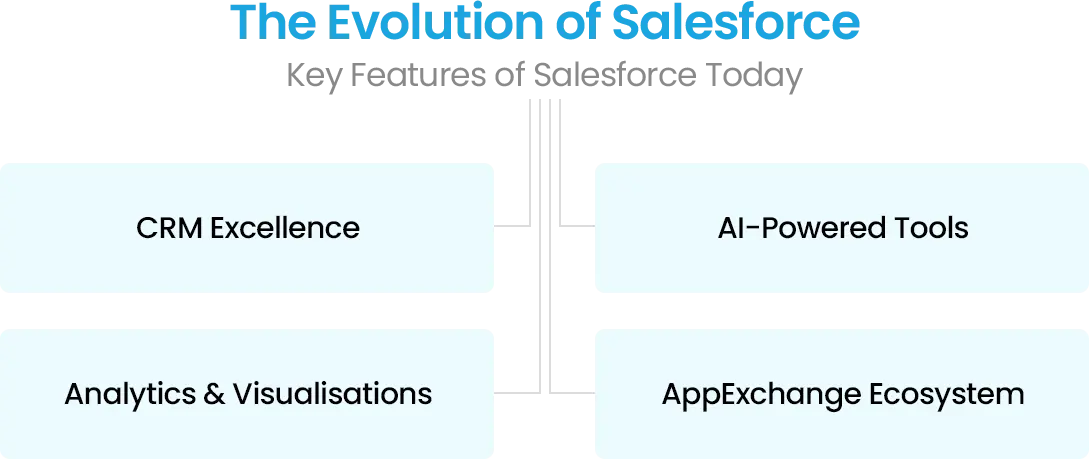The Salesforce evolution has led to a platform that empowers businesses of all scales to streamline operations and foster expansion. With robust features like sales and marketing automation, customer service, and analytics, Salesforce has emerged as a cornerstone in the tech industry.
Its intuitive interface and powerful capabilities have significantly enhanced operational efficiency for businesses. This platform’s impact on the tech sector is monumental, not only revolutionising customer engagement but also catalysing innovation and digital transformation.

What is Salesforce and Its Origin
Salesforce was founded in 1999 by visionaries Marc Benioff, Parker Harris, Dave Moellenhoff, and Frank Dominguez. It has transformed the landscape of customer relationship management (CRM) through its cloud-based platform.
This innovative CRM solution has redefined how businesses manage customer interactions and optimise their sales processes.
The evolution of Salesforce has led to its current status as a global cloud computing giant, offering a diverse portfolio of products and services aimed at empowering businesses of all sizes, enhancing their operational efficiency, and fuelling growth.
It has transformed from a simple CRM tool into a robust development platform, marking a series of major milestones in the Salesforce transformation. This transformation has been marked by several major milestones in the history of Salesforce, each bringing new features and capabilities to the platform.
One of the most notable developments in the Salesforce is its transition from a CRM to a comprehensive development platform. This shift has opened up new opportunities for businesses to customise their Salesforce experience, creating tailored solutions that meet their unique needs.
Salesforce Evolution and Key Milestones in Its Early Years
The release of the Salesforce platform and the introduction of the AppExchange marketplace solidified Salesforce’s position as a leader in the cloud computing industry.
- The rise of Salesforce began with the platform’s launch in 1999, which marked a revolutionary change in how businesses managed customer relationships. It introduced a highly customisable and scalable solution.
- In 2005, the launch of the AppExchange marketplace represented another significant milestone in the Salesforce advancement by enriching the platform with an extensive selection of pre-designed, third-party applications that seamlessly integrated with Salesforce.
- Consequently, Salesforce swiftly emerged as the preferred solution for businesses seeking to optimise their operations, enhance productivity, and foster growth in the digital age.
This user-friendly and versatile platform offered businesses the tools they needed to not only manage customer relationships efficiently but also to navigate the complexities of the modern business landscape effectively.
The Acquisitions and Partnerships that Contributed to Salesforce's Growth
- In 2018, Salesforce’s acquisition of MuleSoft marked a significant milestone, elevating the company’s integration capabilities and extending its reach to a broader customer base.
- Furthermore, the acquisition of Tableau in 2019 strengthened Salesforce’s analytics and data visualisation, providing businesses with the tools to make well-informed, data-driven decisions.
- Salesforce’s strategic alliances with industry giants, such as Google and IBM, have paved the way for seamless integration with their respective cloud platforms.
These well-planned acquisitions and partnerships have not only fuelled Salesforce’s remarkable growth but have also firmly established the company as a frontrunner in both the CRM and cloud computing sectors.
This strategic evolution ensures that Salesforce remains at the forefront, offering cutting-edge solutions to businesses seeking to navigate the intricacies of the digital era.
The Role of DevOps in Salesforce
DevOps plays a crucial role in Salesforce. It bridges the gap between development and operations, facilitating smoother and more efficient processes.
In Salesforce, DevOps has evolved significantly over time. It started with change sets, moved to the Salesforce DevOps Center, and now incorporates DevSecOps principles.
The evolution of DevOps in Salesforce reflects the platform’s commitment to continuous improvement and innovation. It shows Salesforce’s dedication to providing its users with the tools they need to streamline their operations and deliver high-quality services.
The Impact of Salesforce DX
Salesforce Developer Experience (SFDX) is another significant development in Salesforce. Introduced to improve the developer’s experience of building on the platform, SFDX has had a profound impact.
SFDX provides a set of tools designed to facilitate development on the Salesforce platform. It includes features like the Salesforce CLI, a new IDE, scratch orgs, second-generation packaging (2GP), a new metadata format, and the dependency API.
These tools have made it easier for developers to create, test, and deploy applications on Salesforce, significantly enhancing the platform’s usability and versatility.
How Salesforce Incorporated AI and ML Technologies into Its Platform
The seamless integration of Artificial Intelligence (AI) and Machine Learning (ML) into the Salesforce ecosystem not only reflects the CRM evolution but also ensures that businesses can leverage cutting-edge technology to drive efficiency and enhance customer satisfaction, making it a game-changer in the industry.
By seamlessly integrating AI and ML into its platform, Salesforce delivers a suite of intelligent functionalities that empower businesses to streamline operations, elevate customer interactions, and propel their growth.
The demand for professionals with Salesforce skills and expertise is rapidly increasing, making it one of the most promising areas for tech careers in the future. Whether you specialise as a developer, administrator, consultant, or analyst, the Salesforce ecosystem offers a wealth of opportunities for advancement and excellence.
As businesses increasingly recognise the transformative impact of Salesforce on sales and marketing efforts, the need for skilled Salesforce professionals is reaching unprecedented heights.
Salesforce provides a diverse array of certifications and comprehensive training programs, ensuring individuals can continually enhance their skill set and maintain a competitive edge in this ever-evolving field. This makes Salesforce an ideal choice for tech enthusiasts seeking sustained career growth prospects.
Interested to enhance your skills in Salesforce AI? Enrol in Salesforce courses and certifications.
Conclusion
In conclusion, Salesforce stands as a cornerstone in the tech industry. As Salesforce continues to expand and innovate, it consistently introduces a comprehensive suite of cloud-based solutions that empower businesses of all sizes, marking significant steps in the Salesforce evolution.
Its strategic acquisitions, partnerships, and integration of AI and ML have solidified its position as a leader in both CRM and cloud computing.
The demand for professionals with Salesforce skills is skyrocketing, making it a promising field for tech careers. Its wide range of certifications and training programs ensures that individuals can continually upskill and stay competitive in this ever-evolving industry.
Salesforce, with its ongoing evolution and broad influence, is an ideal choice for tech enthusiasts looking for long-term career prospects in the dynamic world of technology.











